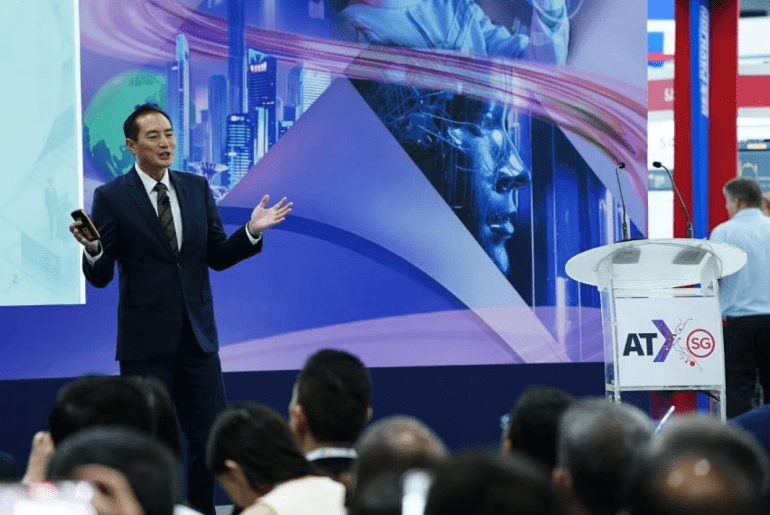- Singapore’s Digital Enterprise Blueprint (DEB) aims to support 50,000 SMEs in leveraging generative AI tools.
- Government to subsidize up to 50% of tech expenses, including AI tools, under the DEB.
- SMEs Go Digital initiative to incorporate AI-enabled solutions and refresh industry digital plans.
- Collaboration between IMDA and tech vendors to provide curated digital solutions and training roadmaps.
- Focus on upskilling 15,000 AI professionals and 18,000 tech workers in high-demand domains.
- Emphasis on cyber security, with SMEs gaining access to health check tools and tailored support.
Main AI News:
In Singapore, approximately 50,000 small and medium-sized enterprises (SMEs) are poised to benefit from support in harnessing the potential of generative artificial intelligence (AI) tools, a sector of AI that has gained significant traction since the advent of the ChatGPT chatbot in late 2022.
As outlined in the recently introduced Digital Enterprise Blueprint (DEB), which outlines Singapore’s forthcoming digitalization strategies, the government will subsidize up to 50 percent of their technological expenditures, encompassing pre-approved AI tools.
At the fourth iteration of ATxEnterprise held on May 29, Mr. Tan Kiat How, Senior Minister of State for Communications and Information (MCI), unveiled the five-year blueprint, emphasizing, “Following the Covid-19 pandemic, SMEs, particularly younger-generation proprietors or executives, express a desire to integrate technology into their operations, yet encounter challenges in identifying where to commence.”
The three-day event, organized by Informa Tech and taking place at the Singapore Expo, serves as the backdrop for this announcement.
Under the existing SMEs Go Digital initiative, all pre-approved solutions will be AI-enabled where feasible, while industry digital plans will undergo refreshment to integrate AI-driven solutions.
Launched in 2017, SMEs Go Digital, a collaboration between the Infocomm Media Development Authority (IMDA) and technology vendors, has facilitated digitalization in SMEs across diverse sectors, benefitting over 90,000 entities since its inception.
These roadmaps furnish SMEs with a systematic framework to pinpoint suitable digital solutions and training regimens, ensuring employees acquire the requisite skill sets at each phase of their digital transformation journey.
According to a collaborative report from IMDA, MCI, and the Cyber Security Agency of Singapore (CSA), there exists a curated roster of approximately 400 pre-approved digital solutions, with around 20 percent already AI-enabled.
One such beneficiary is Agora CoLearning, an educational establishment catering to children, which has leveraged AI solutions to streamline tasks such as report correction and content generation for electronic communications.
The DEB amalgamates all extant tech schemes, including an initiative to train approximately 15,000 AI professionals by embedding them in corporate AI programs.
Furthermore, 18,000 tech professionals will undergo reskilling in AI and other high-demand technology domains.
Collaborating with IMDA, the Singapore Computer Society (SCS) will continue to bolster training efforts, encompassing AI ethics and governance as part of the Information and Communications (I&C) Jobs Transformation Map steering committee’s curriculum.
The government encourages skills-based recruitment to enhance job suitability, with over 200 companies already pledging their commitment to this approach as of May 2024.
Transitioning from a 15-year tenure as an optometrist, Mr. Christopher Tan now embarks on a hybrid role of business analyst and developer at digital transformation firm Temus, citing the resilience of tech-driven enterprises during the pandemic as motivation for his career transition.
Temus’ program facilitates individuals’ entry into tech roles devoid of prior experience, furnishing them with essential technical and soft skills to embark on careers as junior full-stack developers.
The DEB prioritizes cyber security, ensuring all SMEs can access cyber security health check tools, which are already accessible.
These tools empower enterprises to evaluate their cyber hygiene, benchmark against industry peers, and access resources to address identified vulnerabilities.
SMEs necessitating additional support can avail themselves of the Chief Information Security Officer as-a-Service scheme, engaging cyber security consultants to devise customized cyber security strategies.
Additionally, pre-approved digital solutions under SMEs Go Digital will adhere to established data protection and cyber security standards, catering particularly to SMEs lacking in-house cyber security resources.
Solutions handling personal data will incorporate fundamental data protection and security measures such as encryption, backup, and two-factor authentication to fortify the baseline of personal data protection.
Mr. Tan emphasizes the imperative for SMEs to scale swiftly to capitalize on market opportunities, both domestically and internationally, noting the challenges posed by legacy systems.
He underscores the advantage for SMEs adopting pre-approved solutions, ensuring seamless integration and scalability as their businesses expand.
Conclusion:
The initiatives outlined in Singapore’s Digital Enterprise Blueprint represent a significant leap forward in empowering SMEs to embrace digitalization and AI technologies. By subsidizing tech expenses and providing comprehensive support in upskilling and cyber security, the government is fostering an environment conducive to innovation and growth within the SME sector. This strategic approach not only enhances the competitiveness of SMEs in the domestic market but also positions them favorably for global expansion and resilience in the face of future disruptions.

